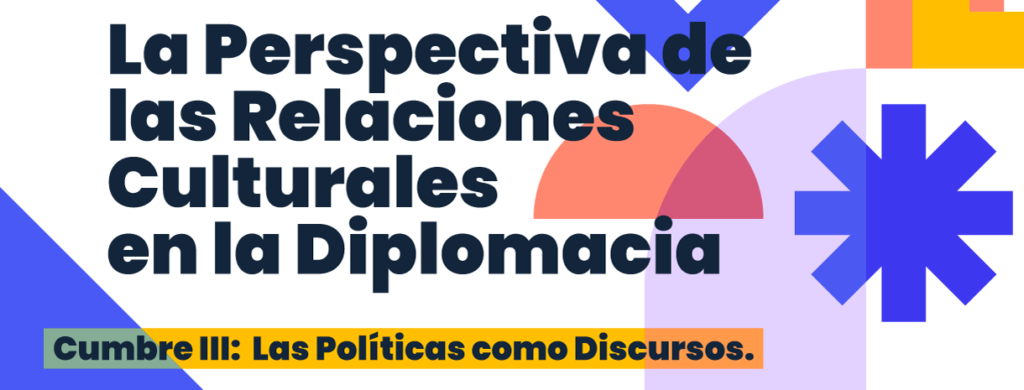<<Return to main Summit 3 page
Thursday May 26, 2022
Virtual and In-Person at Aula Magna at Universidad Panamericana, Mexico City
Unless otherwise stated, the sessions also will be hosted on Zoom and streamed on Facebook Live. All keynote presentations and panels will use the same Zoom link, which will be emailed to you once you register for the event.
Session 2 Schedule
8:00 AM (PT) / 10 AM (CT) / 11:00 AM (ET)
Welcoming remarks
Conveners:
- Cecilia Canal. Vice-Chancellor campus Mexico City, Universidad Panamericana.
- Pablo Raphael de la Madrid. General Director for Promotion and Cultural Events, Ministry of Culture, Mexico and Co-Organizer for Mondiacult 2022.
- Guadalupe Moreno T. Coordinator of the Program on Cultural Policy & Management, Universidad Panamericana.
8:30 AM (PT) / 10:30 AM (CT) / 11:30 AM (ET)
Keynote- The Future of Cultural Diplomacy
Cultural Diplomacy is a constantly changing field of thought and action; today it involves a diversity of platforms, agendas and actors eager to represent their identities and interests in the international sphere. The discourses within cultural diplomacy, therefore, are situated and the associated cultural policies as well; they are a reflection of processes of negotiation, collaboration or resistance within societies and also between them. In this panel, we seek to think about a possible horizon for cultural diplomacy taking into account the transformations of glocal contexts, the new conditions of the international system and the urgent need to take seriously the cultural alterities (otherness), thus promoting cooperation and mutual understanding.
Keynote Speaker:
- Carla Dirlikov Canales. Senior Fellow, Harvard Advanced Leadership Initiative, Harvard University.
Moderator:
- Avril Joffe. Head of the Cultural Policy and Management Department, University of the Witwatersrand
9:30 AM (PT) / 11:30 AM (CT) / 12:30 (ET)
Roundtable- Film as cultural diplomacy: Contesting field of imagination
Film is an essential aspect of cultural diplomacy. Through audiovisual screenings, people from around the world are able to experience different eras, cultures, and worldviews. It is also a place to (re)imagine reality, find new alternatives, and even use fiction to contest it. The development of networks of cooperation across borders through cinema can provide new forms of people to people engagement, with or without government support. However, when these forms of art are included in the cultural policy of a country in an effort to pursue national interests, the discourse takes a different turn.
In this panel, our speakers reflect on the possibilities and challenges of cinema as cultural diplomacy, the implications of including it as part of national public policy, and its role as diplomatic tools. The goal is to see this field as a space that can support diplomatic activity while serving as a space for resistance and contestation where different futures can be imagined. Futures which include marginalized communities and those who have not been represented in the visual imaginary.
Participants:
- Francisco Ruiz. Professor of Social and Political Science, Universidad de las Américas Puebla.
- Francisco Peredo. Professor of Communication, Universidad Nacional Autónoma de México (UNAM).
- Scott MacKenzie. Professor and Head of the Department of Film and Media Studies, Queen’s University.
- Toby Miller. Stuart Hall Professor of Cultural Studies, Universidad Autónoma Metropolitana-Cuajimalpa.
Host:
- Guadalupe Moreno T. Director of the Master in Arts Management and Cultural Policies, Universidad Panamericana.
10:45 AM (PT) / 12:45 PM (CT) / 1:45 PM (ET)
Artist acknowledgment: Mariana Yampolsky
We celebrate the life and work of Mariana Yampolsky, a Mexican-American photographer who portrayed the social life of 20th-century Mexico. His legacy continues to be a huge reference point for collective memory and for critical thinking about recurrent inequalities and the richness of Mexican culture. Today his photographic collection is at Universidad Iberoamericana in Mexico City.
Host:
- Deborah Caplow. Professor of Art History, University of Washington.
11:00 AM (PT) / 13:00 PM (CT) / 14:00 PM (CT)
Happening: Ñuu Savi History and memory
The talk is based on the historical memory of the Ñuu Savi language and culture, where we are located, who we are, what our cultural and linguistic system is, in order to contribute the attention of the interested group, as prior knowledge to the systemic development of language. And since this language constitutes a good for the world, inasmuch as it contributes different ways of understanding life, for example; greetings, classification, of plants, animals.
Facilitator:
- Celerina Sánchez. Mixtec singer and poet.
Host:
- Mariana Kiimi. Graduate of the Master’s on Migration Studies, Universidad Iberoamericana.
